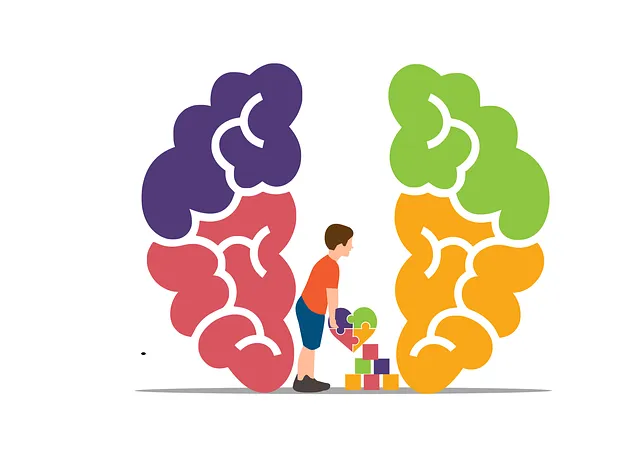The text discusses the stigma surrounding mental illness as a significant barrier preventing people from accessing crucial support and treatment, such as that offered by Englewood Kaiser Permanente mental health services. This cycle is fueled by societal misconceptions and fear of judgment. Effective strategies to break down these barriers include communication approaches, healthcare provider burnout prevention, and encouraged self-care practices. Englewood Kaiser Permanente has made strides in destigmatizing mental health issues through comprehensive services, community outreach programs, educational workshops, and collaborations with local influencers. They measure success through multifaceted approaches, including participant feedback, service utilization tracking, and community attitude monitoring, and continue to engage communities, healthcare providers, and policymakers for sustained progress.
Mental illness stigma significantly hinders individuals from seeking help, leading to exacerbated symptoms and decreased quality of life. This article explores comprehensive stigma reduction efforts, focusing on strategies employed by Englewood Kaiser Permanente’s mental health services. We discuss the profound impact of stigma, highlight their initiatives, and delve into educational programs, community involvement, and measurement techniques. By examining these approaches, we aim to foster understanding and promote a more inclusive society for those facing mental health challenges.
- Understanding the Impact of Stigma on Mental Health Seekers
- Englewood Kaiser Permanente's Role in Stigma Reduction
- Educational Initiatives to Combat Misconceptions
- Involving Communities and Influencers in Awareness Campaigns
- Measuring Success and Continuing Support for Stigma-Free Environments
Understanding the Impact of Stigma on Mental Health Seekers

Stigma surrounding mental illness can significantly hinder individuals from seeking necessary support and treatment. This phenomenon, often rooted in societal misconceptions and fear, can lead to a cycle of isolation and avoidance of vital resources like those provided by Englewood Kaiser Permanente mental health services. Those grappling with mental health challenges might retreat from discussing their struggles, fearing judgment or discrimination, which can exacerbate existing symptoms.
Understanding the profound impact stigma has on individuals’ willingness to access mental health care is crucial. It’s not merely an issue of personal courage but a complex interplay of societal attitudes and individual experiences. Effective communication strategies, alongside burnout prevention strategies for healthcare providers and encouraged self-care practices, are essential tools in breaking down these barriers. By fostering inclusive environments and promoting open conversations about mental health, we can ensure that those in need feel supported and empowered to pursue treatment without the fear of stigma-related consequences.
Englewood Kaiser Permanente's Role in Stigma Reduction

Englewood Kaiser Permanente has played a significant role in reducing stigma surrounding mental health issues through its comprehensive mental health services. Recognizing the impact of societal perceptions on individuals seeking support, the organization has initiated several impactful programs. One notable effort is their Community Outreach Program, which aims to educate and engage community members on mental wellness topics, fostering an environment where conversations about mental health are normalized.
Through this program, Kaiser Permanente Englewood reaches out to diverse communities, offering workshops, seminars, and interactive sessions focused on stress management and overall well-being. By addressing mental health directly and promoting open dialogue, they strive to break down barriers and reduce the stigma associated with seeking help. These initiatives reflect a holistic approach to healthcare, acknowledging that mental wellness is integral to overall community health.
Educational Initiatives to Combat Misconceptions

Englewood Kaiser Permanente’s mental health services have been at the forefront of combating stigma through educational initiatives. They recognize that misconceptions about mental illness are a significant barrier to individuals seeking help. Therefore, their programs focus on providing accurate information and fostering understanding. Workshops and seminars targeting both the community and schools aim to dispel myths and offer insights into various mental health conditions. These sessions highlight the importance of emotional intelligence and self-awareness exercises, boosting confidence in recognizing and managing one’s mental well-being. By educating individuals about the nuances of mental health, Englewood Kaiser Permanente strives to create a more inclusive environment where people feel comfortable discussing their experiences without fear of judgment.
Involving Communities and Influencers in Awareness Campaigns

Englewood Kaiser Permanente mental health services have been at the forefront of innovative stigma reduction efforts, recognizing the power of community involvement in fostering a supportive environment. By enlisting the help of local influencers and community leaders, these initiatives gain momentum and reach diverse audiences. This collaborative approach leverages the trust and connections these figures have within their communities to dispel myths and promote understanding around mental illness.
Through targeted campaigns, they address prevalent concerns such as burnout prevention, crucial for healthcare providers who often encounter high-stress situations. By integrating burnout prevention strategies into awareness programs, Englewood Kaiser Permanente equips individuals with tools to recognize and manage their own well-being while advocating for better mental health support on a larger scale. This inclusive strategy paves the way for a more compassionate and informed society, where mental illness is met with empathy rather than stigma.
Measuring Success and Continuing Support for Stigma-Free Environments

Measuring success in stigma reduction efforts is a complex task, but it’s crucial to assess the impact and effectiveness of initiatives aimed at fostering mental health awareness. Organizations like Englewood Kaiser Permanente have led the way in providing exceptional mental health services, which can serve as models for others striving for stigma-free environments. They employ various methods to gauge progress, including participant feedback, tracking service utilization rates, and monitoring changes in community attitudes through surveys and focus groups. By quantifying these factors, they can identify what works best and make informed adjustments to their programs.
Continuing support for stigma-free environments involves sustained efforts beyond initial campaigns. Engaging communities, healthcare providers, and policymakers is essential to ensure long-term success. Initiatives such as Burnout Prevention Strategies for Healthcare Providers focus on supporting mental wellness among those who dedicate their lives to helping others, thereby indirectly enhancing Mental Health Awareness. Regular training, support groups, and policy reforms that promote understanding and empathy are key to maintaining a culture where individuals with mental illness feel accepted and supported.
Mental illness stigma reduction is a multifaceted approach that involves education, community engagement, and supportive initiatives. Englewood Kaiser Permanente’s leading role in this endeavor showcases the power of collaborative efforts in creating a more accepting society. By combining educational initiatives with community involvement, they’ve not only combated misconceptions but also fostered a stigma-free environment. These strategies are essential for encouraging those seeking mental health services to receive the care they need without fear of judgment. Through continuous measurement and support, we can further enhance these efforts, ensuring that everyone has access to understanding and compassion in their mental health journey.






